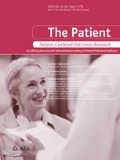References
Paasche-Orlow MK, Taylor HA, Brancati FL. Readability standards for informed-consent forms as compared with actual readability. N Engl J Med. 2003;348:721–6.
Menikoff J, Kaneshiro J, Pritchard I. The common rule, updated. N Engl J Med. 2017;376:613–5.
United States Department of Heath and Human Services. Federal policy for the protection of human subjects. Final rule. Fed Regist. 2017;82:7149–274.
Weinfurt KP, Hall MA, King NM, Friedman JY, Schulman KA, Sugarman J. Disclosure of financial relationships to participants in clinical research. N Engl J Med. 2009;361:916–21.
Horng S, Grady C. Misunderstanding in clinical research: distinguishing therapeutic misconception, therapeutic misestimation, and therapeutic optimism. IRB. 2003;25:11–6.
Jepson M, Elliott D, Conefrey C, et al. An observational study showed that explaining randomization using gambling-related metaphors and computer-agency descriptions impeded randomized clinical trial recruitment. J Clin Epidemiol. 2018;99:75–83.
Krieger JL, Neil JM, Strekalova YA, Sarge MA. Linguistic strategies for improving informed consent in clinical trials among low health literacy patients. J Nat Cancer Inst. 2016. https://doi.org/10.1093/jnci/djw233.
Flory J, Emanuel E. Interventions to improve research participants’ understanding in informed consent for research: a systematic review. JAMA. 2004;292:1593–601.
Acknowledgements
We thank all of the members of the P-CARE Patient Advisory Panel and P-CARE study staff. This article is written on behalf of the entire panel.
Author information
Authors and Affiliations
Corresponding author
Ethics declarations
Funding
Research reported in this article was funded through a Patient-Centered Outcomes Research Institute Award (ME-1402-10638). The views presented in this article are solely the responsibility of the authors and do not necessarily represent the views of the Patient-Centered Outcomes Research Institute, its Board of Governors, or Methodology Committee.
Conflict of interest
Neal W. Dickert, JoAnne Brabson, Rodney J. Hunter, and Michele Riedford have no conflicts of interest that are directly relevant to the contents of this article.
Rights and permissions
About this article
Cite this article
Dickert, N.W., Brabson, J., Hunter, R.J. et al. Patient-Consent Disconnects in Clinical Research. Patient 11, 577–579 (2018). https://doi.org/10.1007/s40271-018-0331-7
Published:
Issue Date:
DOI: https://doi.org/10.1007/s40271-018-0331-7

